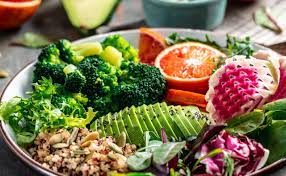Introduction
In a world overflowing with fad diets and conflicting nutritional advice, it’s crucial to establish a clear understanding of the fundamental building blocks of nutrition. By making informed choices and embracing a balanced approach to eating, you can harness the potential of food to promote vitality and overall well-being.
Understanding Macronutrients and Micronutrients
At the core of nutrition are macronutrients (carbohydrates, proteins, and fats) and micronutrients (vitamins and minerals). Each plays a unique role in supporting bodily functions, from energy production to immune system maintenance. Balancing these nutrients is key to nourishing your body effectively.
Building a Balanced Plate
Creating a well-rounded meal involves combining different food groups in appropriate portions. Opt for whole grains, lean proteins, healthy fats, and a variety of colorful fruits and vegetables. This approach not only provides essential nutrients but also supports digestion and sustained energy levels.
The Power of Hydration
Staying adequately hydrated is often underestimated but is vital for optimal bodily functions. Water plays a role in digestion, circulation, temperature regulation, and more. Aim to consume a sufficient amount of water throughout the day to maintain vitality.
Cellular Function and Nutrient Transport
Water serves as a medium for countless biochemical reactions that occur within your cells. It aids in the transportation of nutrients, electrolytes, and hormones throughout your body. Adequate hydration ensures that your cells receive the necessary nutrients to function optimally and maintain their structure.
Temperature Regulation
Your body regulates its temperature through a process called thermoregulation. Sweating is one of the primary mechanisms used to dissipate heat and maintain a stable body temperature. However, sweating leads to fluid loss, and if not replenished through proper hydration, it can result in dehydration, leading to overheating and potential health risks.
Digestion and Detoxification
Water is essential for proper digestion and absorption of nutrients. It helps break down food, allowing your body to extract vital nutrients from the ingested substances. Furthermore, hydration supports the efficient elimination of waste products through urine, helping to detoxify your body and prevent the buildup of harmful substances.
Cognitive Function and Mood
Dehydration can adversely affect cognitive function and mood. Even mild dehydration can lead to difficulty concentrating, decreased alertness, and impaired memory. Additionally, staying hydrated helps maintain a stable mood and can contribute to reducing feelings of anxiety and stress.
Joint and Tissue Health
Proper hydration is essential for maintaining the health of your joints and tissues. The synovial fluid that lubricates your joints is primarily composed of water. Staying hydrated ensures that your joints move smoothly and reduces the risk of discomfort and stiffness.
Energy Levels and Physical Performance
Water is fundamental to energy production within your body. Cells require adequate hydration to produce energy efficiently. When you’re dehydrated, you may experience fatigue and reduced physical performance, making everyday tasks and exercise more challenging.
Skin Health and Appearance
Hydrated skin appears healthier and more vibrant. Water helps maintain skin elasticity and supports the natural process of skin renewal. Dehydration can lead to dryness, flakiness, and an increased appearance of wrinkles.
Signs of Dehydration
Recognizing the signs of dehydration is crucial for addressing it promptly. Symptoms may include dark yellow urine, dry mouth, thirst, headache, dizziness, and reduced urine output. By being mindful of these signals, you can take action to rehydrate and prevent further complications.
Hydration Tips
- Carry a Water Bottle: Keep a reusable water bottle with you throughout the day as a reminder to drink water regularly.
- Set Hydration Goals: Aim for a specific daily water intake based on your body’s needs and activity level.
- Hydrate Before Exercise: Drink water before, during, and after physical activity to maintain fluid balance.
- Incorporate Hydrating Foods: Consume water-rich foods like fruits and vegetables to supplement your hydration.
- Listen to Your Body: Pay attention to thirst cues and drink water when you feel thirsty.
- Limit Dehydrating Beverages: Reduce consumption of dehydrating beverages like caffeine and alcohol.
- Monitor Urine Color: Aim for pale yellow urine as an indicator of adequate hydration.
- Hydrate in Extreme Conditions: In hot weather or high-altitude environments, increase your fluid intake to compensate for fluid loss.
Exploring Nutrient-Rich Foods
Certain foods are packed with nutrients that promote health and vitality. Leafy greens, berries, nuts, and seeds are excellent sources of vitamins, minerals, and antioxidants. Incorporating these foods into your diet can help ward off illnesses and enhance your overall sense of well-being.
Embracing Functional Foods
Functional foods are those that offer specific health benefits beyond basic nutrition. Ingredients like turmeric, garlic, and ginger possess anti-inflammatory and immune-boosting properties. Integrate these functional foods to optimize your health journey.
Unveiling Superfoods for Vitality
Superfoods are nutrient powerhouses that provide exceptional health benefits. From quinoa and chia seeds to blueberries and salmon, these foods are rich in vitamins, minerals, and antioxidants. Including superfoods in your meals can contribute to increased vitality.
Mindful Eating: A Holistic Approach
Mindful eating involves savoring every bite and paying attention to your body’s hunger and fullness cues. By slowing down and being present during meals, you can foster a healthier relationship with food and prevent overeating.
Plant-Based vs. Animal-Based Diets
The debate between plant-based and animal-based diets continues. Both approaches have their merits, and choosing the one that aligns with your values and health goals is essential. Whether you’re a vegetarian, vegan, or omnivore, focusing on nutrient density is key.
Navigating Food Allergies and Intolerances
Food allergies and intolerances can have a significant impact on your diet and well-being. Identifying trigger foods and finding suitable alternatives is crucial to prevent discomfort and ensure you’re receiving the necessary nutrients.
The Role of Supplements
While a balanced diet should ideally provide most nutrients, supplements can fill potential gaps. Consult with a healthcare professional to determine if supplements such as vitamin D, omega-3 fatty acids, or probiotics are necessary for your individual needs.
Creating Healthy Eating Habits
Establishing healthy eating habits is more effective than short-term diets. Focus on portion control, mindful eating, and regular meal times. Over time, these habits become second nature, promoting sustained wellbeing.
Meal Planning and Preparation
Planning and preparing meals in advance can help you make nutritious choices consistently. Design balanced menus, batch-cook ingredients, and have healthy snacks on hand to avoid impulsive, less nutritious options.
Social and Cultural Aspects of Eating
Food often holds cultural and social significance. Embrace these aspects by sharing meals with loved ones and exploring new cuisines. Balancing tradition and health-conscious choices can lead to a more fulfilling eating experience.
The Path to Long-Term Wellbeing
Optimal health and wellbeing are lifelong pursuits. By staying informed, experimenting with different foods, and listening to your body, you can embark on a rewarding journey toward vitality and lasting wellness.
Conclusion
Nutrition forms the cornerstone of a vibrant and healthy life. With this guide, you’ve gained insights into the multifaceted world of nutrition and its impact on your vitality. By making mindful food choices, embracing balance, and nurturing a positive relationship with food, you have the power to elevate your wellbeing and lead a life full of energy and vitality.
FAQs
- Q: Can I achieve optimal health solely through diet? A: While nutrition plays a significant role, other factors like exercise, sleep, and stress management also contribute to overall health.
- Q: How can I determine the right portion sizes for me? A: Portion sizes vary, but using your hand as a guide (palm for proteins, fist for carbohydrates, thumb for fats) can help gauge portions.
- Q: Are all fats bad for my health? A: No, healthy fats from sources like avocados, nuts, and olive oil are essential for bodily functions and should be included in your diet.
- Q: What if I have dietary restrictions? A: There are numerous alternatives available for individuals with dietary restrictions, ensuring they still receive a balanced diet.
- Q: How can I make mindful eating a habit? A: Start by eating without distractions, savoring each bite, and paying attention to hunger and fullness cues. Practice makes perfect!




